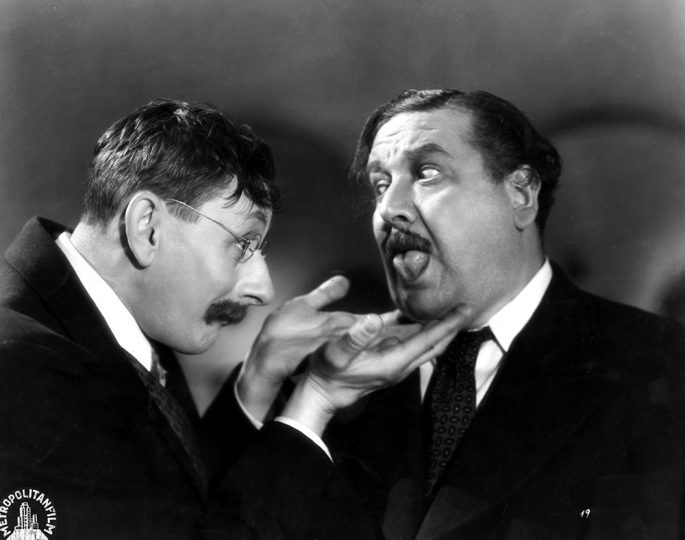The beginnings of the film career of the popular theatre comedian Vlasta Burian date back to the silent film era, when, for example, he joined Anna Ondráková in a silly comedy The Lovers of an Old Criminal (Milenky starého kriminálníka, 1927). However, his versatile talent, of which verbal comedy played an important part, could only be fully demonstrated with the advent of sound.
Burian’s very first sound film, Imperial and Royal Field Marshal (C. a k. polní maršálek), directed by Karel Lamač in 1930, became a hit with the public and arose even more interest than attractive foreign films. The film was based on a farce by E. A. Longen, which had staged a year earlier at Burian’s theatre. The same model would later be used for Burian’s other films, usually literary and theatrical adaptations. Attempts to write an original film theme for the popular actor never garnered much success (e.g. Three Boiled Eggs, [Tři vejce do skla, 1937]).
In Prague alone, Imperial and Royal Field Marshal was screened for 22 weeks in a row. However, the popularity of the film, also filmed in German and French versions, was not limited to Czechoslovakia. According to information from the time, audiences in Berlin and Paris also howled with laughter, which helped make Burian more visible abroad. While the renowned Czech cabaret performer became an international film star, making two or three films a year, Lamač began receiving job offers from abroad.
In the course of another cooperation between Lamač and Burian, on the comedy You Don’t Know Hadimrška (To neznáte Hadimršku, 1931), Martin Frič was invited to direct both the Czech and German versions. Again, this was originally a well-attended play. It was to Frič, as his apprentice, that Lamač left the direction of other Burian comedies. He himself was too busy filming and doing business in other European countries.
Lamač and Burian did not resume their collaboration until just before the Munich Agreement was signed with the comedy Ducháček Will Fix It (Ducháček to zařídí, 1938). This was a safe bet by Lamač. The script by proven Václav Wasserman was based on the three-act theatrical farce by Rudolf Österreicher and Rudolf Bernauer, which premiered at the Vlasta Burian Theatre in 1931.
The successful performance continued screening for the entire season, with a total of around 130 repetitions. Burian kept the lead role, while other actors and actresses changed. The subject matter of the film did not undergo any notable changes, which some critics of the time, familiar with Burian’s theatre version of the same material, reproached the filmmakers for.
Burian plays the role of Jan Damián Ducháček in the film as well as on stage, a somewhat pedantic but devoted director of a law firm. He takes it upon himself to lead his boss, Dr Faukner (Ladislav Hemmer), out of his infatuation with Julia (Adina Mandlová), a daughter of the old aristocratic Rispaldic family.
In fact, Faukner, with a mind blinded by love, is secretly supporting the prominent family, still living in the spirit of the pre-war Austrian aristocracy, from his finances, the so-called X-account. Although Julie reciprocates the lawyer’s feelings, her relatives consider him insufficiently noble and are preventing their marriage. Therefore, Ducháček, a man unusually skilled in rhetoric and calculation, intervenes.
Burian was, of course, the main draw of the film, which in the second half pokes fun at the outdated monarchical order. His role of a pragmatic accountant had already been worked out in detail from the theatre. In front of Otto Heller’s camera, according to the critics, he performed his part based on punchy ironic lines, and verbal balance, but also rich facial expressions and movement, with the same vitality as in his time on stage.
In contrast, the performances of the other actors were seen to be mechanical and cautious. Just like the visual concept of the film with bland flat shots. According to press reports, the comedy owes its high attendance and enduring popularity almost exclusively to the relaxed delivery of Vlasta Burian, who proved to be as reliable an employee as his Ducháček.
The last time Lamač and Burian worked together was during the filming of the comedy He Stood at the Till (U pokladny stál…), which premiered on 10 February 1939. Once again, it was a remake of a play from the Burian’s theatre repertoire. The film was also the last that Lamač directed in Czechoslovakia before he left abroad for good.
Ducháček Will Fix It (Czechoslovakia 1938), director: Karel Lamač, screenplay: Václav Wasserman, director of photography: Otto Heller, music: Eman Fiala, cast: Vlasta Burian, Ladislav Hemmer, Milada Gampeová, Karel Máj, Adina Mandlová, Čeněk Šlégl, Jaroslav Marvan, Jiřina Sedláčková, Václav Trégl and others. Metropolitan, 86 min.


